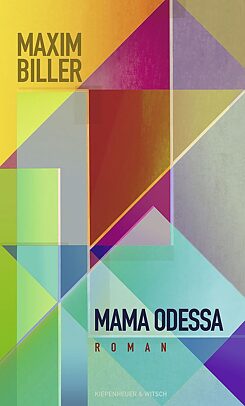Cherrypicker
Love Too Late
With his new novel, Maxim Biller has created a touching literary memorial to his mother.
By Holger Moos
Mother-son relationships can be notoriously difficult, as in Maxim Biller’s new novel Mama Odessa. Biller tells the story of the Grinbaum family, who, like Biller’s own family, fled the Eastern Bloc in the 1970s, but never escape their past. At the centre is the first-person narrator Mischa and his opinionated but caring mother Alyona. She dislikes the people in the West, “who always pretend to be very busy,” like the neighbour who tells her how bad she feels when all she does all day is read crime novels.
The family left Odessa because of Misha’s father Gena – an anti-communist and ardent Zionist who longs for Israel. He and his family remain in Germany, however, and Gena continues to dream of the Promised Land. The unfulfilled and the unfulfillable are a quintessence of human existence in Biller’s work.
Nazi whore in a clinker brick house
Ironically, Mischa’s father meets a young German woman during a visit to a kibbutz in Israel, of all places, with whom he begins an affair and leaves his family. “That stupid shiksa! Goes to Israel as a good German to soothe her conscience as a dishwasher in the canteen of Jad Vashem or wherever, and shortly afterwards destroys a Jewish family,” is Mischa’s mother’s verdict. Misha’s father finally moves with this “Nazi whore,” as Alyona likes to call her, into a small clinker brick house in Hamburg-Othmarschen.Mischa is a writer who writes “one sad emigrant novel after another.” His mother also writes all her life, preferably in the car in a supermarket car park. She adores Anna Akhmatova, but becomes a writer herself too late, and therefore does not see herself as such. Thanks to the contacts of her successful son, Alyona is able to publish at least one book, albeit at an advanced age.
Interspersed throughout the novel are texts by Alyona, who misses her hometown all her life and struggles with the fact that she didn’t return to Odessa for her father’s funeral. One of her stories is about a compass that saved her father’s life, which was passed on to those born after him to provide orientation, but “later in life... would rarely help.” In real life, the object sacred to the father was simply lost, suggesting that emigrants can never find their footing and orientation.
Don’t tell me about your problems
Biller skilfully weaves history into the plot. For example, the family, especially Alyona, suffers from bouts of the “Katschmorian blues” named after her grandfather. This “lovely, cheerful Armenian” grandfather, for all his jollity, thought more often of suicide than other people do of love and food, perhaps because he was one of the few people to survive the massacre of the Jews at Tolbuchin Square in Odessa in 1941.Misha only learns about some things after his mother’s death, when he finds letters in her desk that Alyona wrote to her son but never sent. In one of the letters, she equates her son with a childhood sweetheart – real proof of her affection. So much comes (too) late in this novel, Alyona’s career as a writer, her maternal proofs of love, the posthumous attention the son pays to his mother. Everyday life during her lifetime, by contrast, was filled with reluctant telephone calls: “How are you, my boy? But please don’t tell me about your problems and your girls again!”
Writing and secrets
About Alyona’s writing: “My mother could never invent while writing; only occasionally conceal things.” Perhaps this hints at Biller’s writing process as well. It is pointless to discuss what corresponds to experienced reality and what is made up. So-called reality is a negligible and, moreover, unreliable quantity. Who can say what it was really like? In a novel, it’s not so much the fidelity to facts that counts, but above all the credibility of the story told. And in this sense Mama Odessa is absolutely credible.Biller has succeeded – in spite of his typical sarcasm – in creating a tender homage, a swan song to his mother, who died in 2019, but also to a world and time that has passed on, that is always passing on. Biller’s characters are close and distant at the same time. They long for closeness, yet their stubbornness with a tendency towards the egocentric gets in the way. Thus Mama Odessa is a very good, but also very sad book. It tells us that mutual understanding and tenderness are only possible when it’s too late: in the face of death or perhaps only when a person has arrived in the realm of the shadows.
Maxim Biller: Mama Odessa. Roman
Köln: Kiepenheuer & Witsch, 2023. 240 p.
ISBN: 978-3-462-00486-1
You can find this title in our eLibrary Onleihe (also as audiobook).

